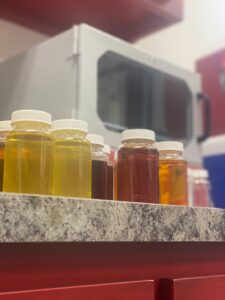Groundwater resources vary in their quality and quantity across the Lone Star State. Groundwater samples may contain natural and man-made substances in various concentrations depending on variables such as the proximity to septic systems, agricultural projects, and suburban development.
Episodes such as droughts and floods can impact well water quality. Additional foreign contaminants could make their way to a well head, or lack of precipitation may increase mineral concentrations in samples.
Testing well water every few years is recommended by health professionals to monitor potential contaminants.
Common groundwater contaminants include the following:
- Organic compounds
- VOC’s (Volatile Organic Compounds)
- Pesticides
- Chlorinated Solvents/Benzene
- Inorganic Compounds
- Heavy & semi-metals (ex: Lead, Aluminum & Arsenic)
- Chlorides
- Dissolved Solids
- Calcium Carbonate
- Nitrates
UTGCD does not perform testing on surface water bodies, and recommend interested parties seek out TCEQ or their local river authority.
The Texas Commission on Environmental Quality maintains a full database of NELAP laboratories.
https://www.tceq.texas.gov/agency/qa/env_lab_accreditation.html
What types of water quality testing exist?
Many simple or at home kits can test water for a variety of parameters, including pH, dissolved solids, and iron oxides.
If an organization or financial entity requests a water test associated with the closing or purchasing of a property, these tests verify inorganic, organic, and chemical by-products concentrations outlined by the Environmental Protection Agency, and subsequenty, the Texas Commission on Environmental Quality.
Together, all these values factor in to providing a “clean bill of drinkability” by a licensed laboratory.
These standards, known as the National Primary Drinking Water Regulations, can be found at the link below.
https://www.epa.gov/ground-water-and-drinking-water/national-primary-drinking-water-regulations


